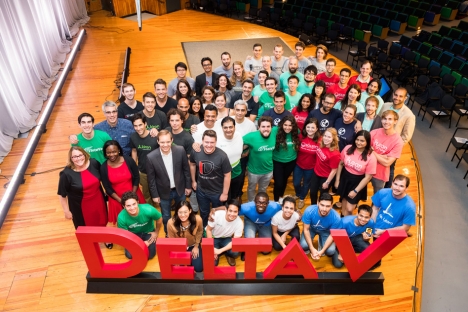
Congratulations to all of the teams that presented at our Educational Accelerator Demo Day! We kicked off MIT’s campus-wide t=0 celebration of entrepreneurship and innovation, which will continue through September 18.
If you couldn’t join us, this post gives a quick recap; and you can catch all of the presentations on video as well. For an overview of the companies presented, check out this BostonInno article – “These are the 17 Startups MIT Kept Hush-Hush this Summer.”
First of all, in my last post I had let you know that our Global Founders’ Skills Accelerator (GFSA) would be changing its name. We are now MIT’s delta v accelerator. Why the name change? The derivative of velocity is acceleration! Hence, the MIT Acceleration Program delta v.
delta v literally means a change in velocity, and we believe this truly captures what happens to these students when they join us for MIT’s accelerator program.
The delta v Demo Day is focused on MIT students, and students filled the auditorium and were even sitting in the aisles. Our Managing Director Bill Aulet kicked of the program and explained how these startups have reached “escape velocity” and have been “kicked out of the house” so to speak.
Bill was followed by keynote speaker Dharmesh Shah, the CTO of HubSpot and an MIT grad. He talked about increasing the success for these student startups – how to get started, why you should avoid stealth mode, why speed matters, how to find a co-founder, attract amazing people, and give yourself crazy ambitious goals. He tells students to take advantage of all your classes to hone your skills… and he says he has never heard of a single entrepreneur who regrets taking a shot at a startup (even if it failed).
Governor Charlie Baker also joined us at Demo Day, and spoke about the amount of wizardry that comes out of MIT and the staggering contribution that MIT has made to the Commonwealth of Massachusetts, the country and the world.
It was then on to the student presentations. Fourteen startups made it through to Demo Day, and their company ideas covered topics from mental health to virtual reality. We saw compelling videos from farmers whose lives have been changed because of MIT students, transportation in Rwanda and Mexico that will reduce costs for carriers, a way to make freight transportation more efficient and increase the income of truck drivers, and several ways to improve the environment. We learned about innovations could change the lives of families dealing with cancer treatment and students in Africa.
Interested in learning more? Check out the companies that presented. They are listed below, in alphabetical order, along with links to their websites. And, if you have a bit more time, check out the teams presenting in our Demo Day video recording.
Alfie
Armoire
Deepstream
dot Learn
Emerald
Factory Shop
FleteYa
Hive Maritime
kiron
Kumwe Logistics
Lean on Me
Leuko Labs
perch
Rendever
ricult
Solstice Initiative
I think everyone who attended Demo Day was inspired and impressed by the power of entrepreneurship at MIT. Now, we’re onward and upward, with t=0 this week with a full schedule of activities every day. Later this month, the delta v teams will be heading to New York City and San Francisco to meet with alumni and investors.
We hope you are inspired too!


